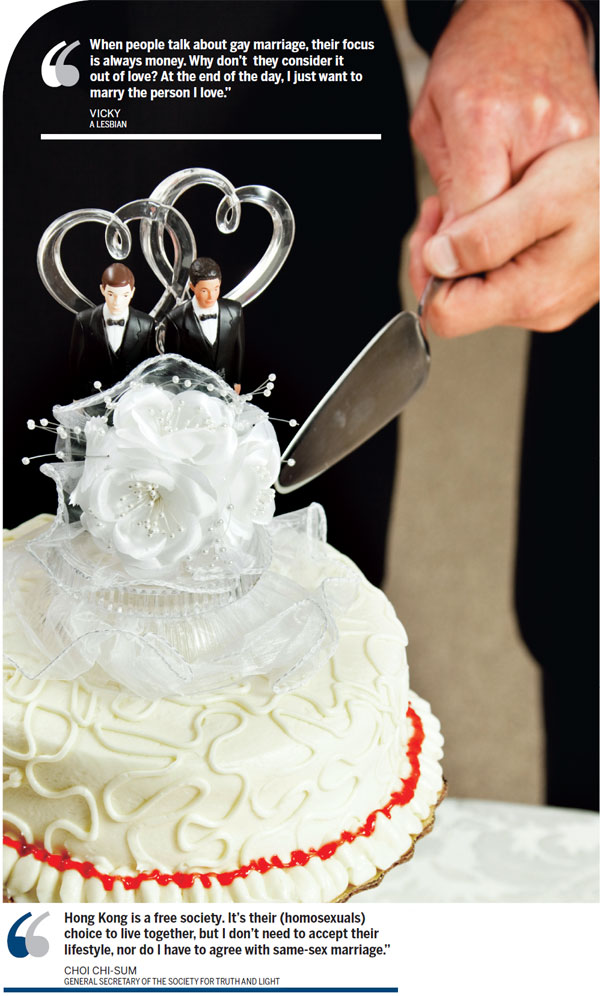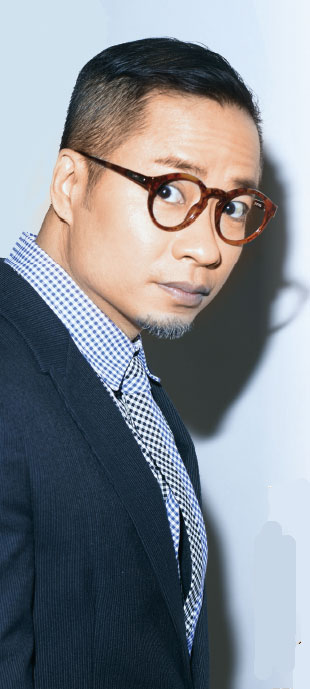Taking on life with gay abandon
Updated: 2013-09-20 15:32
By Ming Yeung(HK Edition)
|
|||||||||
Gay marriages are blossoming everywhere, as social barriers come crashing down almost at once, but not in conservative Hong Kong, where pressure is building against the prejudice toward same-sex couples. Ming Yeung reports.
Jacky never recovered from the heartbreak of separating from the one he loved, and who for ten years was his soul mate. He wanted to stay - even until his last breath - but the love between Jacky and another man did not survive, even after three years of being legally married, when his partner's parents in Canada refused to accept the bond.
The investment banker, now in his mid-40s, remembers the look of cold loathing in the eyes of his partner's father. It made him feel like some unsavory character, even a criminal.
The two young men had met at a social gathering and soon fell in love. Jacky's partner was a high school teacher from a family he described as "exceptionally traditional". "He was the eldest son of a family of intellectuals, and expected to produce offspring to carry on the family name," Jacky said softly.
"When we became stable, he talked to his parents about our relationship. His father went ballistic, and said (to Jacky's partner), 'If you want to be with him, I will renounce you.' The words made the school teacher feel as if he'd had his heart torn out," Jacky recalled. "But he decided to leave the family and be with me."
The bittersweet love was hijack
|
Brian Leung, chief campaigner for Big Love Alliance, declares the homosexual community has finally come out to fight for the rights they deserve, after decades of feeling deprived and victimized by discrimination. |
ed by Fate, when they were given the shocking diagnosis that his partner had cancer of the kidney. The illness had entered its final stage and Jacky's partner was given but six months to live.
Jacky remembers the day the teacher called his father to say goodbye before entering hospital and with tears in his eyes, to plead with his father to accept Jacky. But the old man was unmoved, and declared he would never accept Jacky as his "son-in-law".
While his partner lay unconscious, near death, Jacky was ordered to leave the ward. He never saw his partner again, nor was he invited to the funeral.
"I feel like I owe him lots. I didn't fulfill my vow to be with him until he died" Jacky paused, searching for the right words to express his feelings. "I keep asking myself this question all these years and still haven't figured out an answer, 'What did I do wrong?'"
Same-sex marriage is not permitted in Hong Kong. It is not recognized, even in cases like that of Jacky and his partner with the couple legally married elsewhere. Same-sex partners can't be considered in public housing applications, tax allowances for spouses, health-care insurance, applications for entry by family members for family reunions or the disposal of estates.
The once reticent gay community, however, has stepped out from the shadows in recent years and become more militant-spurred, to some extent by high-profile coming-out-of-the-closet announcements by leading pop singers and a newly elected lawmaker.
Peter and Vicky never may fulfill their dream that one day they may marry and start a family. They are star-crossed lovers who, like Romeo and Juliet, or "the Butterfly Lovers," are separated by society and its conventions. Both are Hong Kong citizens denied the right to marry each other because they are lesbians.
They have been together since 1990, back in the days when even the word homosexual was seldom spoken in polite company. Their relationships with their respective families took on a kind of "don't ask, don't tell" armistice, with both families "sort of accepting" their "daughters-in-law".
"Marriage is fine but for people like us, I never thought it was necessary," Peter told China Daily. Lately, however, Peter started to feel differently and began considering tying the knot with her longtime girlfriend. "It is a commitment to her. I don't care about other people."
It won't happen in Hong Kong, so the couple plans to fly to the UK or France next year, or the year after, to go through the formal and legal exchange of vows.
Brian Leung, chief campaigner for Big Love Alliance, declares the homosexual community has finally come out to fight for the rights they deserve, after decades of feeling deprived and victimized by discrimination.
"Everyone's equal before the law. We're just asking for the rights enjoyed by heterosexuals for so long. What's wrong with that?" asked Leung, who used to have a partner from the US. When the relationship became stable, the couple began to consider entering a new stage and starting a family. Neither Hong Kong nor his partner's hometown allowed gay marriage. Feelings cooled, and as the two saw no future together, they parted.
LGBT advocates rally
Big Love Alliance, a non-profit organization, was co-founded early this year by Legislative Councilors Cyd Ho Sau-lan and Raymond Chan Chi-chuen, artists Anthony Wong Yiu-ming and Denise Ho Wan-sze, socialite celebrity Gigi Chao, and some others who advocate equal rights for the LGBT (lesbian, gay, bisexual, and transgender) community.
Apart from not being entitled to the same rights in law as a married couple, Leung said, gay couples are not even entitled to next of kin rights when their partners are ill in hospital, nor are they permitted to claim the remains when their partners die.
Last November, a motion proposed by Cyd Ho, calling for public consultation on legislation to protect the rights of sexual minorities, was voted down by the Legislative Council. The failure proved a catalyst, triggering more aggressive action from the LGBT community, pressing for rights they assert.
Leung cited a meeting with the former chairman of the Equal Opportunities Commission (EOC) Lam Woon-kwong two years ago, recalling that Lam had predicted same-sex marriage would need two decades to be legalized due to fierce opposition from religious groups.
"We never expected the pressure for same-sex marriage would gain worldwide momentum so fast. Over the last years it drove some places to legalize gay marriage over a short period of time," Leung said.
"The world is constantly changing. Ask Lam Woon-kwong the same question again today, he might give us a different answer," he added.
As of August 2013, 15 countries and several sub-national jurisdictions in the US and Mexico have given their sanction, allowing same-sex couples to marry.
Lam's successor at the EOC, York Chow Yat-ngok, already has pledged to accelerate protection for people with different sexual orientations, vowing that legislation to protect sexual minorities will be passed during his three-year tenure at the post.
The former secretary for food and health, a devoted Christian, acknowledged that there is widespread, unfair treatment of homosexuals in workplaces and schools.
"Three things have become increasingly clear: first, LGBT individuals and their families do face enormous hardships. Secondly, the government must put in place policies and laws to protect these minority groups from discrimination. Third, the proposed legislation would destroy neither 'family values' nor freedom of speech, nor would it lead to reverse discrimination," Chow wrote in an Op/Ed piece in July.
Brian Leung believes legislation on discrimination against homosexuals and legalizing same-sex marriage could be put on the legislative agenda concurrently.
"How much longer should we wait until the anti-discrimination law is enacted? If we do nothing and the government keeps procrastinating (to delay legislation), we will always be at the starting point of the path leading to our ultimate goal - the right to marriage," Leung reckoned.
Marriage not a privilege
Choi Chi-sum, general secretary of the Society for Truth and Light, opposes gay marriage, contending that the institution of marriage is based strictly on the bond between a man and a woman. Altering the status quo, he said, would adversely affect family coherency, and undermine the stability of society as a whole.
"Marriage is a system, not a privilege," Choi affirmed. "If something is being legalized, that means most people have already supported it."
"Hong Kong is a free society," Choi added. "It's their (homosexuals') choice to live together, but I don't need to accept their lifestyle, nor do I have to agree with same-sex marriage."
"We don't seek to twist the definition of a traditional marriage, we want to broaden and enrich it," Leung explained, rejecting the argument that permitting gay marriage encourages a homosexual lifestyle.
Leung said that equal rights activists are willing to fight for their rights in a progressive manner. Following examples from Western countries, Hong Kong may introduce what he calls "a junior version of same-sex marriage" - civil partnership.
Civil partnerships give same-sex couples most, but not all, the rights and responsibilities of civil marriage.
Civil partnership is not something only for gay couples, Leung said. Many heterosexual lovers who want to enter commitments, not so solemn as marriage, would love to try it out. These relationships still are terminated only by death, dissolution or annulment.
Although many gay couples like Peter and Vicky traveled overseas to marry, Leung said, they did so just to fulfill their dream to experience a romantic ceremony. "When they are back in town, everything remains the same and their marriage is not permitted and without protection here."
"Don't you think it's ironic to get through all the hassles to get to a foreign place to have a wedding ceremony but can't do it at home?"
Aging is definitely an added burden of anxiety to people in same-sex relationships. Hoping to have the hospital visitation right is the greatest motivation for Peter to seriously consider marrying Vicky.
But that certificate of marriage granted in a foreign country is not recognized in Hong Kong. She hopes same-sex marriages will be sanctioned in this "conservative city" during her lifetime, but she dares not to predict how much longer she will have to wait. "Why homosexuals are being labeled as abnormal?" asked Vicky angrily. "Why do I have to let other people decide whether I can marry?
"Marriage is a commitment of love. It shouldn't be measured by the kind of welfare I get after marriage or how much asset I obtain when my partner dies. When people talk about gay marriage, their focus is always on money. Why don't they consider it out of love? At the end of the day, I just want to marry the person I love," Vicky said.
Contact the writer at mingyeung@chinadailyhk.com

(HK Edition 09/20/2013 page4)
